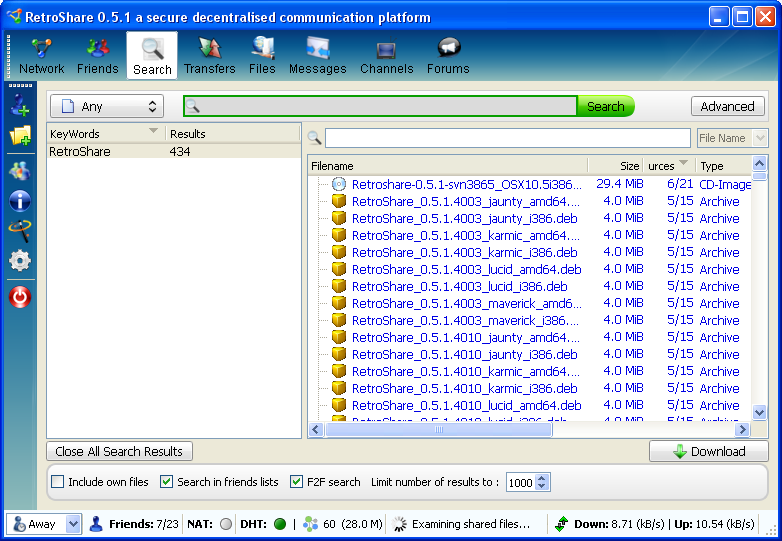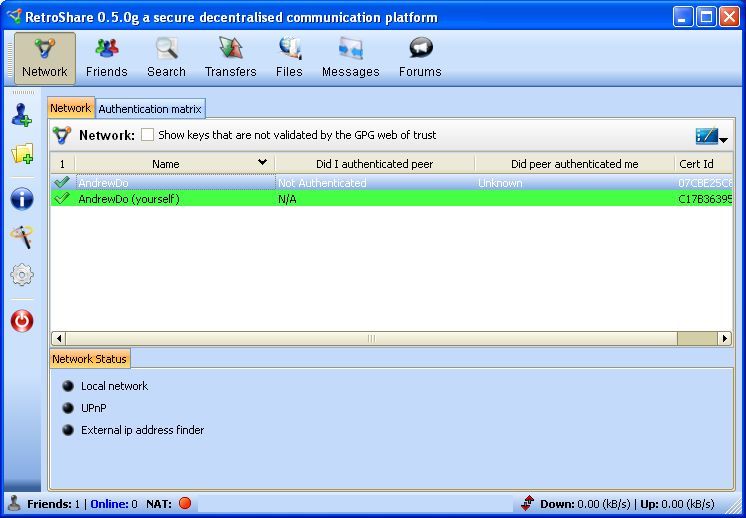

With this, we can create “self-restricted” circles, which will only be visible to people in the “invitee” list. Now, let’s complicate this thing a bit further: since circles are also “GXS groups”, they can be themselves restricted to other circles, including themselves. With this system, circles can contain anonymous IDs as well as signed IDs. Doing so, only people which are true members of the circle are able to see and handle that data, and to request and send message content. forum IDs, etc) for the set of members, using envelop encryption.

Security of circle-restricted forums/channels/… is ensured by encrypting the data for the message IDs, and group Meta Data (e.g. Status: states whether you are a member or not.

Unless restricted to another circle, they are made visible to your neighbour nodes, so that people in this node can e.g. The later means you created the circle, which allows you to grant membership, and invite people to be a member. Your role: you are either a “user”, or an “admin”. A circle can indeed be restricted to another circle (see “self-restricted circles” below). Circle ID: This allows you to disambiguate which circle you’re dealing with. Tooltips on each circle tree entry give information about: request membership for one of your identities, or grant membership if you’re the administrator of a circle A contextual menu in each circle and each invitee/member of a circle allows you to act appropriately. Yellow means that you’re either applied and are waiting to be accepted, or invited and have the possibility to accept to be a member The bullet displays information about your status. “Circles I belong to”) and other circles. The GUI displays circles for which you are a member (a.k.a. This two-way membership not only allows people to request membership, but also prevents arbitrary circles to be created in order to spam unwanted information/data through neighbour nodes Only the administrator of a circle can grant you, by adding you in the “invitee” list. People need to meet two conditions in order to be a member of a circle: they need to “apply for membership” and they need to be “granted as member”. The downside is that the whole thing can be a bit scary A lot of options and handles are available there, for maximum flexibility. A new tab in “People” allows you to create/modify them. External circles represent sets of pseudo-anonymous identities. They stand for the base architecture element of a future social network layer.

Both features considerably enhance the privacy of media that uses them. The choice is available when creating, or when editing the properties of a forum. This happens in two different ways: limitation to a group of pseudo-anonymous identities (the ones in People), or limitation of a group of friend nodes (the ones in Network). Forums, channels and posted threads (and any entity represented by a a “GXS group”) can now be limited in their distribution. Group-based privacy for channels/forums/posted:
Retroshare 0.6.1 windows 10#
Windows XP / Vista / Windows 7 / Windows 8 / Windows 10 vulnerable ▲ - version is potentially vulnerable as there are related CVEs.RetroShare-0.6.1-20160903-53e26983-Qt5-setup.exe.ignored - version is ignored and excluded from comparison for some other reason (e.g.untrusted - this source is known to likely supply incorrect versions, so is ignored proactively.version not officially released yet, or lacking alpha/beta/rc qualifier). incorrect - version is known to be incorrect (e.g.noscheme - the project does not have official versioning scheme, so versions used in repositories which are basically random.rolling - package is fetched from always latest snapshot or VCS master/trunk, so it is always latest and is not a subject for comparison.This is assumed to be legacy version preserved for e.g. legacy - outdated version when a newer version is present.outdated - outdated version which requires updating.unique - package is only present in a single repository family, there are no other sources to compare it against, so although it's latest version known to repology, is not really reliable.There may be both devel and newest versions for a given package. devel - newest known devel (or unstable) version.The number shows how many repository families have this version. all Debian versions as well as Ubuntu and other derivatives make a single family) contain this package. Spread means how many repository families (e.g.


 0 kommentar(er)
0 kommentar(er)
